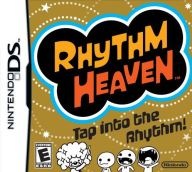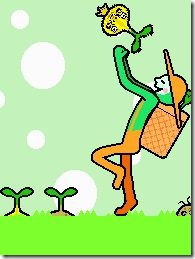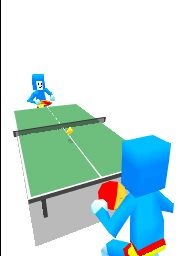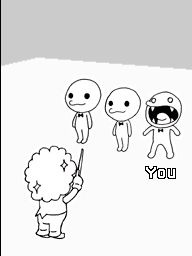 Rhythm Heaven, a DS game that is a sequel to Rhythm Tengoku, a Japanese-only release on the GBA, has come to the states and provides a nice alternative to standard rhythm games while still providing that quirkiness factor that such games often bring with them. While the core game is pretty easy to get through, it is difficult to master, and backed by a great presentation to make it worth struggling to master it all.
Rhythm Heaven, a DS game that is a sequel to Rhythm Tengoku, a Japanese-only release on the GBA, has come to the states and provides a nice alternative to standard rhythm games while still providing that quirkiness factor that such games often bring with them. While the core game is pretty easy to get through, it is difficult to master, and backed by a great presentation to make it worth struggling to master it all.
Gameplay: A
Rhythm Heaven is the distant cousin of the Warioware games, in that it presents a number of minigames (60 in total but with basically 24 “unique” games). These aren’t fired rapidly at you as Warioware would do, but instead provides a short games – from 30 seconds to a few minutes – that involve tapping or “flicking” to a song’s rhythm. The game is presented vertically like a book, akin to Brain Age, with the ability to flip it around if you are left-handed.
The games are arranged in ten tiers of five games each, which you have to play through in order to unlock them all. Each tier has four basic games and then a “remix” that combines the elements of those four games. The last four tiers are harder versions of the previous games, with remixes that include elements from other games not in that tier, which can lead to some unexpected results.
All these games can be described as either “call and answer” type games, where you need to mimic a specific rhythm given to you in the phrase before, or games where you have to wait for specific cues and respond in the right way. The actions are simplistic; tapping or tapping and holding, “flicking” like a air hockey puck, and in some cases just sliding back and forth. There’s no hotspot – anywhere on the touchpad works, and thus you can focus most of your attention on the other screen where most of the time you can use the visual cues provided by the game’s animation to time your moves. Surprisingly, however, this can be a hindrance sometimes – I found at least a few games that ignoring the screen and playing with my eyes closed was much easier to complete than the visual distraction of the animation. Most of the games is preceded by a tutorial that is skippible at any time to review what the cues and actions are for each game.
After completing the song (which doesn’t have any variation, so you can work through these by memorization), you’re graded on how well you performed. If you fail, you have to try again – and annoyingly, you have to wait for the game to go back to the game selection screen, then reselect the game, and then click through the tutorial, which is annoying on some of the tougher games. However, to the game’s benefit, if you screw up a game three times in a row, you can stop in the game’s “cafe” and have that game considered “cleared” so that you can progress – meaning that you basically can unlock everything with about a couple hours worth of effort. Alternatively, you can simply pass, or you can get a near-perfect or better rating, which earns you a medal. Medals are used in the game to unlock more rhythm-based minigames. Furthermore, these games will sometimes be highlighted on the main screen, allowing you the chance to run though it with a perfect result in order to unlock the game’s music or other features that you can watch later.
The game itself is a bit on the tough side, particularly anything involving flicking as if you’re too “weak” with the flick, it won’t register right. It’s also got a very narrow “hit” window for some games, though with practice, you can anticipate these better. However, there were still games that game me a tough time. One require you to volley a ping-pong ball back and forth with flicks, and I just had a hard time with the timing even when I didn’t focus on the graphics. However, most of the rest of them are really well done, embodying the basics of music and rhythm – playing on the eights, triplets, and off-beats. The remixes are definitely the highlight as it still makes all these games feel consistent yet with enough chaotic nature to make them difficult. Completing all the games isn’t hard, but mastering this game is a challenge.
Value/Replayability: B+
Opening up everything in the game will take a few hours, but getting everything mastered will take a while. However, like with most other rhythm games, there’s not that much replayability – the song actions remain the same, and are presented in the same order. Of course, it helps that many of the songs are catchy and worthwhile to play again.
Graphics: A
Like Warioware, the game uses a number of graphic styles for the games – from simple black-and-white penciling, sprite-based games, and simple 3D graphics. Most work quite well, and particularly for the remixes, the differences in style help to quickly identify what game and actions you need to match. It’s nothing particularly amazing but works well for the game.
Audio: A
For a rhythm game, the audio is very important, and it does not fail in Rhythm Heaven. All the songs used are nice and upbeat with a lot of variations in beats and speed to provide a wide range of challenges. It’s not necessary quirkly like Katamari Damacy, but perfectly fine for a game like this.
Overall: A-
Rhythm Heaven is a great game if you like rhythm games in general, quirky Japanese games, or just games that are fun. It’s not quite like any previous DS game such as Elite Beat Agents, and if you’re into these games for the music, this may not catch you as much as others. But, it does provide a nice challenge, is well presented as an overall package, and shows promise for more games in the same vein without wearing out the formula too much.
Filed under: nintendo-ds, review, rhythm, rhythm-heaven |







Leave a comment